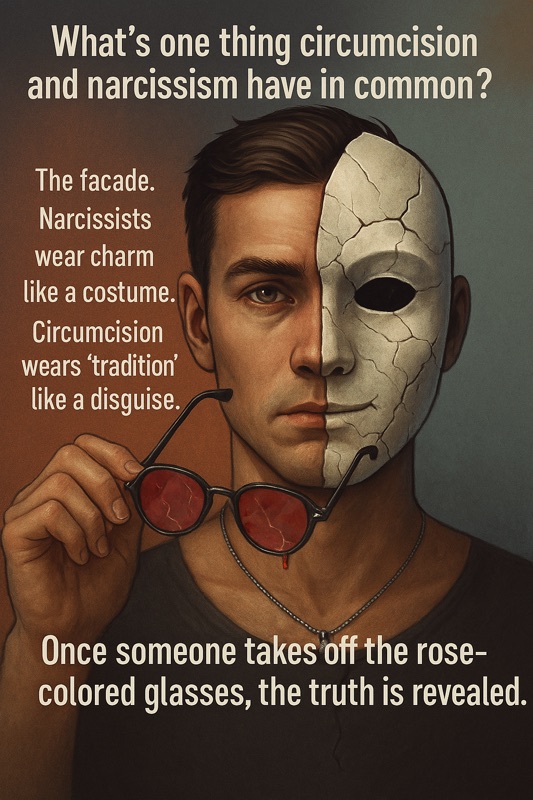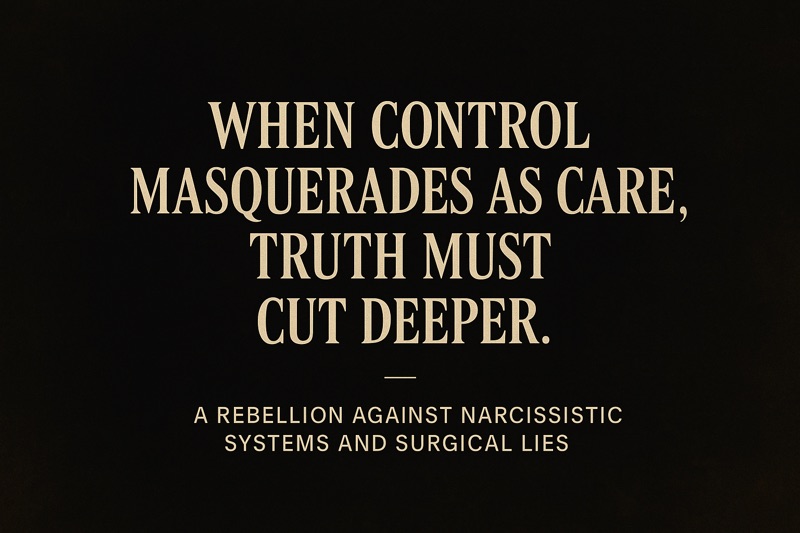The Narcissist’s Scalpel: A Psychological and Cultural Analysis of Circumcision Through the Lens of Narcissism
The Narcissist’s Scalpel: A Psychological and Cultural Analysis of Circumcision Through the Lens of Narcissism
A REBELLION AGAINST NARCISSISTIC SYSTEMS AND SURGICAL LIES
By Jayson Lobos aka AvocadoJay23
✌️💚🥑🍌 | “Genitals Shouldn’t Have Scars.”
⸻
Abstract
This paper explores the disturbing psychological and cultural parallels between narcissistic abuse and the practice of non-consensual male circumcision. Through clinical frameworks, survivor testimonies, and sociological insights, it reveals how circumcision echoes key traits of narcissism: boundary violation, identity erasure, control, and emotional manipulation. The medical, religious, and societal narratives used to justify circumcision mirror the classic tactics of narcissistic abuse: gaslighting, denial, and rebranding harm as love. Ultimately, this analysis positions circumcision not as a harmless cultural norm, but as a psychological reenactment of inherited trauma, masked by systemic narcissism.
⸻
I. Introduction
What if circumcision is not merely a cultural or medical procedure—but a ritual reenactment of narcissistic abuse? In its deepest psychological sense, circumcision reflects a social and emotional pattern in which one group or individual exercises control over another’s body, violates boundaries, and reframes harm as care—all classic hallmarks of narcissism.
This paper argues that circumcision parallels narcissistic behavior in multiple dimensions: boundary violation, identity erasure, coercive control, and justification through false narratives. Just as narcissists manipulate, dominate, and reframe their abuse as love or necessity, so too does society frame circumcision as “normal,” “beneficial,” or “religious.” In truth, both acts prioritize the narcissist’s comfort and control over the wellbeing of the person whose boundaries are being violated.
⸻
II. Understanding Narcissism: A Framework for Abuse
Narcissism is more than vanity—it is a personality structure that lacks empathy, exploits others, and manipulates perception to maintain control. According to the DSM-5, Narcissistic Personality Disorder (NPD) is characterized by a grandiose sense of self-importance, need for admiration, and lack of empathy.¹
In dysfunctional family systems, narcissism often manifests through the parent-child dynamic, where children are viewed not as autonomous beings, but as extensions of the parent’s identity.² These parents feel entitled to control and alter their children, both physically and emotionally, under the guise of “doing what’s best.” This dynamic lays the groundwork for viewing circumcision through a narcissistic lens.
Key narcissistic behaviors that parallel circumcision include:
• Boundary violation
• Erasure of identity
• Rewriting the narrative to justify harm
• Gaslighting the victim into believing it was for their good
• Institutional complicity in masking harm as tradition or necessity
“The narcissist doesn’t just cross your boundaries. They tell you those boundaries never mattered to begin with.”³
⸻
III. Circumcision as a Narcissistic Act
1. Control Over Another’s Body
Circumcision is done without consent—usually in infancy. The child is silenced, restrained, and surgically altered. This parallels how narcissists impose their will on vulnerable individuals who cannot resist.
“A narcissist doesn’t seek love. He seeks control. Circumcision is no different—it’s control disguised as care.”⁴
2. Violation of Bodily Autonomy
The foreskin is not a birth defect—it is functional, protective, and sensitive.⁵ Yet it is routinely removed under cultural or aesthetic reasoning. This mirrors how narcissists invalidate the inherent worth of another’s traits or needs, reshaping them to fit their ideal.
3. Erasure of Identity
The foreskin is an integral part of male anatomy, containing thousands of nerve endings and a unique gliding mechanism.⁶ Its removal is not cosmetic—it is an amputation that forever alters a person’s sexual identity, function, and experience.
Just as narcissists mold others to match their image, circumcision reshapes a boy’s body to conform to another’s fears, beliefs, or projections.
4. Gaslighting and Narrative Control
We are told, “He won’t remember,” “It’s cleaner,” “It’s for his own good.” These are not facts—they are manipulative phrases to minimize the trauma and justify the harm. It is the language of collective gaslighting.
“Gaslighting isn’t always about denial. Sometimes it sounds like: ‘It was for your protection.’”⁷
⸻
IV. Narcissistic Parenting: The Child as a Proxy
In narcissistic families, children exist to reflect the parent’s needs, beliefs, or legacy. The child is a projection surface, not an autonomous being. This dynamic is deeply tied to the decision to circumcise.
“I wanted him to look like me.”
— A common justification by circumcised fathers, revealing a subconscious need to pass on their trauma rather than confront it.
Circumcision becomes a ritual of enmeshment—a physical declaration that “you are mine to shape.” In this context, circumcision is a narcissistic parent’s attempt to erase difference, enforce sameness, and pass down unhealed identity wounds.
“Narcissistic parents don’t raise children. They replicate versions of themselves.”⁸
⸻
V. Institutional Narcissism: Medical and Religious Complicity
1. Medical Narcissism
The modern medical system often denies harm, minimizes trauma, and prioritizes institutional authority over patient autonomy. The refusal to recognize circumcision as genital mutilation is not based on science—it is based on ego, profit, and legacy.
“The arrogance of medicine is in thinking it can redefine harm simply by dressing it in a white coat.”⁹
2. Religious Narcissism
Historically, circumcision was a symbolic bloodletting. But over time, religious leaders demanded more flesh, more pain, more control—transforming it into a complete amputation.¹⁰ This shift mirrors how narcissistic abuse escalates over generations.
“God doesn’t need your foreskin. But a narcissist needs proof of your obedience.”¹¹
In both cases, circumcision reflects a power ritual, where institutions manipulate belief systems to gain access to the most sacred thing—the body.
⸻
VI. Survivor Psychology: The Narcissistic Wound
Many circumcised men feel a deep, invisible grief—but society invalidates their experience. This mirrors the emotional aftermath of narcissistic abuse: confusion, silence, denial, and shame.
• “It’s not a big deal.”
• “You’re overreacting.”
• “Be grateful for your parents.”
These are classic gaslighting responses. Many men never even realize what was taken from them until they stumble upon intactivist education, often in adulthood.
“The deepest wounds are the ones we were told we shouldn’t feel.”¹²
Healing involves reclaiming bodily truth, rejecting false narratives, and understanding that what was done to them was not love, but violation.
⸻
VII. Breaking the Cycle: Awareness and Autonomy
To heal from narcissistic systems, we must:
• Speak the truth without shame
• Educate others with clarity and compassion
• Protect children from the legacy of unhealed trauma
• Restore autonomy—both physically and emotionally
Movements like intactivism are not just medical campaigns—they are resistance movements against a culture of normalized narcissism.
“Reclaiming the foreskin is not just about skin—it’s about sovereignty.”¹³
⸻
VIII. Conclusion
Circumcision is not just a cultural norm—it is the embodiment of a narcissistic legacy that normalizes bodily violation, silences victims, and reframes harm as help. Like all forms of narcissistic abuse, it thrives in secrecy, denial, and tradition. But healing begins with truth.
“Narcissism says: ‘You are mine to shape.’
Integrity says: ‘You are whole as you are.’”¹⁴
The body is not a canvas for inherited fear. It is sacred. And until we protect children from narcissistic rituals masked as love, we will continue to raise the next generation in silence and scar tissue.
⸻
Footnotes
1. American Psychiatric Association. Diagnostic and Statistical Manual of Mental Disorders (DSM-5), 5th ed.
2. Miller, Alice. The Drama of the Gifted Child. Basic Books, 1997.
3. Forward, Susan. Toxic Parents: Overcoming Their Hurtful Legacy.
4. Clopper, Eric. Sex & Circumcision: An American Love Story.
5. Taylor, J. R. et al. “The Prepuce: Specialized Mucosa of the Penis.” British Journal of Urology, 1996.
6. Cold, C. J., & Taylor, J. R. “The Prepuce in Pediatric Medicine.” Medical Anatomy Research, 1999.
7. Lundy Bancroft. Why Does He Do That? Inside the Minds of Angry and Controlling Men.
8. Shahida Arabi. Power: Surviving and Thriving After Narcissistic Abuse.
9. Gollaher, David. Circumcision: A History of the World’s Most Controversial Surgery.
10. Goldman, Ronald. Questioning Circumcision: A Jewish Perspective.
11. Ehrlich, Paul. “Ancient Practices of Circumcision in the Hebrew Scriptures.” Biblical Archaeology Review, 2003.
12. Survivor testimony, YourWholeBaby.org
13. Bonobo3D. The Elephant in the Hospital. Documentary film.
14. Lobos, Jayson. Advocating Avocado Essays & Intactivist Truths, 2025.
“When Control Masquerades as Care, Truth Must Cut Deeper.”
— A Rebellion Against Narcissistic Systems and Surgical Lies
- “Exposing the Narcissism Beneath the Blade.”
- “Not Protection. Possession.”
- “Circumcision: The Narcissist’s First Act.”

IX. The Inheritance of Harm: Intergenerational Narcissism and the Legacy of Circumcision
This section would explore how trauma becomes tradition when it is never questioned, and how generations of men have unknowingly passed down harm under the guise of love, strength, or faith.
Key Points to Include:
• “My father did it to me, so I did it to my son.”
A tragic chain of normalized harm—where a wound becomes a rite of passage instead of something to heal.
• The silence of circumcised men:
Many fathers aren’t malicious—they simply have never been allowed to feel, grieve, or question what was done to them.
• Unhealed trauma becomes identity:
Men often unconsciously defend circumcision because to question it would mean confronting their own loss—and the pain of being betrayed by those they trusted.
“What the narcissist calls love is often the need to repeat their trauma, but from the other side of the blade.”
• The cycle only breaks with consciousness:
The greatest act of love a parent can give is not repeating what was done to them.

📢 Want to Know the Truth?
👉 Watch Now: The Truth About Circumcision
Eric Clopper’s explosive, eye-opening presentation exposes the hidden truths about circumcision, its impact on men’s health, and the medical industry’s role in promoting it. If you care about bodily autonomy and human rights, this is a must-watch.
🔗 Sex & Circumcision: An American Love Story – Eric Clopper
🔗 https://youtu.be/FCuy163srRc?si=-I0uSf9MEV06b
Comments
Post a Comment